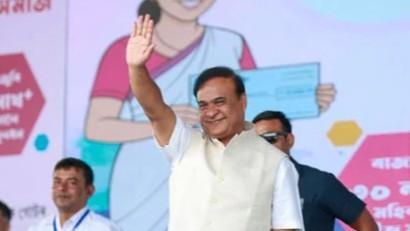
Assam CM helped Nitish work out ₹10,000 for women scheme: Report
In a recent development, it has been reported that the Chief Minister of Assam, Himanta Biswa Sarma, played a significant role in helping the Nitish Kumar government in Bihar to devise a scheme to provide ₹10,000 to women. According to sources, a large part of the credit for Bihar’s scheme to give ₹10,000 to women goes to Assam CM Himanta Biswa Sarma. This revelation has sparked interest in the collaborative efforts between state governments to empower women and promote economic growth.
The scheme in question is the Mukhyamantri Mahila Rojgar Yojana, which aims to provide financial assistance to women in Bihar. The program is designed to support women in starting their own businesses or pursuing other economic activities, thereby promoting self-reliance and independence. The initiative has been widely praised for its potential to uplift women and contribute to the overall development of the state.
As per reports, Assam CM Himanta Biswa Sarma sent his bureaucrats to Bihar around five months ago, at the request of the Nitish Kumar government. The bureaucrats made a presentation before officials on the ‘Jeevika ₹10,000 model’, which was later incorporated into the all-new Mukhyamantri Mahila Rojgar Yojana. This model, developed by the Assam government, served as a blueprint for the Bihar scheme, demonstrating the effectiveness of inter-state cooperation in policy-making.
The ‘Jeevika ₹10,000 model’ is an innovative approach to women’s empowerment, focusing on providing financial support to women to start their own businesses or engage in other economic activities. The model has been successfully implemented in Assam, with positive outcomes and impacts on the lives of women in the state. By adopting this model, the Bihar government aims to replicate the success in its own state, leveraging the expertise and experience of the Assam government.
The role of Assam CM Himanta Biswa Sarma in this initiative is noteworthy, as it highlights his commitment to women’s empowerment and economic development. By sharing the ‘Jeevika ₹10,000 model’ with the Bihar government, Sarma has demonstrated his willingness to collaborate with other states to promote the welfare of women and contribute to the overall growth of the country.
The Mukhyamantri Mahila Rojgar Yojana is a significant initiative, with the potential to benefit thousands of women in Bihar. The scheme is expected to have a positive impact on the state’s economy, as it will enable women to start their own businesses, create employment opportunities, and contribute to the overall development of the state. The success of this scheme will also serve as a model for other states to follow, promoting women’s empowerment and economic growth across the country.
The collaboration between the Assam and Bihar governments on this scheme is a positive example of inter-state cooperation in policy-making. It demonstrates that state governments can work together to share knowledge, expertise, and best practices, ultimately leading to better outcomes for citizens. This approach can be replicated in other areas, such as education, healthcare, and infrastructure development, to promote overall development and growth.
In conclusion, the report that Assam CM Himanta Biswa Sarma helped the Nitish Kumar government work out the ₹10,000 scheme for women is a significant development, highlighting the importance of inter-state cooperation in policy-making. The ‘Jeevika ₹10,000 model’ developed by the Assam government has the potential to make a positive impact on the lives of women in Bihar, and its success can serve as a model for other states to follow. As the country continues to strive for economic growth and development, such collaborative efforts between state governments will play a crucial role in promoting women’s empowerment and overall development.





